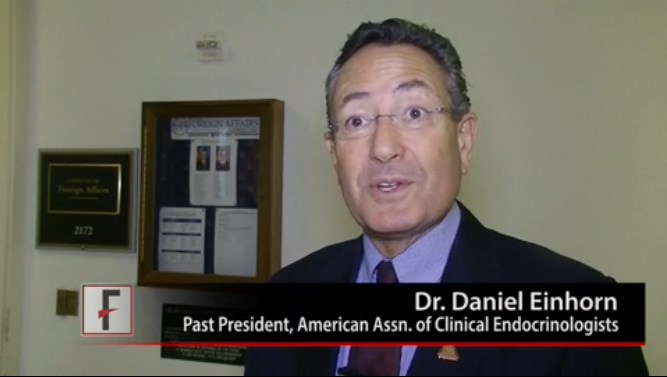User login
WASHINGTON – Congress should back better regulation of glucose-monitoring technologies and expanded access to continuous glucose monitoring for patients with either type 1 or insulin-dependent type 2 diabetes, according to two endocrinology organizations.
At a consensus conference on glucose monitoring, hosted by the American Association of Clinical Endocrinologists and the American College of Endocrinology, advocates pushed for federal legislation that would increase the role endocrinology experts play in setting policy and reimbursement for glucose monitoring.
Inaccurate glucose level readings can have devastating effects, ranging from seizures to coma or even death. Self-test glucose monitoring kits are currently considered the standard of care for people with type 1 diabetes or with insulin-dependent type-2 diabetes.
However, the reliability of the kits has come into question over the years – although knowing which kits are defective is difficult, endocrinology experts noted. That’s in part because adverse event reporting by manufacturers is voluntary, and any data that are collected are not well reviewed.
“What this impressed upon me is the inherent unfairness in the playing field right now,” said Dr. Daniel Einhorn, past president of the AACE and medical director for the Scripps Whittier Diabetes Institute in La Jolla, Calif. “It’s possible to be a company that is less ethical and yet still make it in the market once cleared [by the FDA], because it’s hard to remove it.”
Abbott, Dexcom, Johnson and Johnson, Medtronic, Merck, and several other medical manufacturers supported the conference. Dr. Einhorn disclosed financial relationships with Janssen, Lilly, and Sanofi.
The video associated with this article is no longer available on this site. Please view all of our videos on the MDedge YouTube channel
On Twitter @whitneymcknight
WASHINGTON – Congress should back better regulation of glucose-monitoring technologies and expanded access to continuous glucose monitoring for patients with either type 1 or insulin-dependent type 2 diabetes, according to two endocrinology organizations.
At a consensus conference on glucose monitoring, hosted by the American Association of Clinical Endocrinologists and the American College of Endocrinology, advocates pushed for federal legislation that would increase the role endocrinology experts play in setting policy and reimbursement for glucose monitoring.
Inaccurate glucose level readings can have devastating effects, ranging from seizures to coma or even death. Self-test glucose monitoring kits are currently considered the standard of care for people with type 1 diabetes or with insulin-dependent type-2 diabetes.
However, the reliability of the kits has come into question over the years – although knowing which kits are defective is difficult, endocrinology experts noted. That’s in part because adverse event reporting by manufacturers is voluntary, and any data that are collected are not well reviewed.
“What this impressed upon me is the inherent unfairness in the playing field right now,” said Dr. Daniel Einhorn, past president of the AACE and medical director for the Scripps Whittier Diabetes Institute in La Jolla, Calif. “It’s possible to be a company that is less ethical and yet still make it in the market once cleared [by the FDA], because it’s hard to remove it.”
Abbott, Dexcom, Johnson and Johnson, Medtronic, Merck, and several other medical manufacturers supported the conference. Dr. Einhorn disclosed financial relationships with Janssen, Lilly, and Sanofi.
The video associated with this article is no longer available on this site. Please view all of our videos on the MDedge YouTube channel
On Twitter @whitneymcknight
WASHINGTON – Congress should back better regulation of glucose-monitoring technologies and expanded access to continuous glucose monitoring for patients with either type 1 or insulin-dependent type 2 diabetes, according to two endocrinology organizations.
At a consensus conference on glucose monitoring, hosted by the American Association of Clinical Endocrinologists and the American College of Endocrinology, advocates pushed for federal legislation that would increase the role endocrinology experts play in setting policy and reimbursement for glucose monitoring.
Inaccurate glucose level readings can have devastating effects, ranging from seizures to coma or even death. Self-test glucose monitoring kits are currently considered the standard of care for people with type 1 diabetes or with insulin-dependent type-2 diabetes.
However, the reliability of the kits has come into question over the years – although knowing which kits are defective is difficult, endocrinology experts noted. That’s in part because adverse event reporting by manufacturers is voluntary, and any data that are collected are not well reviewed.
“What this impressed upon me is the inherent unfairness in the playing field right now,” said Dr. Daniel Einhorn, past president of the AACE and medical director for the Scripps Whittier Diabetes Institute in La Jolla, Calif. “It’s possible to be a company that is less ethical and yet still make it in the market once cleared [by the FDA], because it’s hard to remove it.”
Abbott, Dexcom, Johnson and Johnson, Medtronic, Merck, and several other medical manufacturers supported the conference. Dr. Einhorn disclosed financial relationships with Janssen, Lilly, and Sanofi.
The video associated with this article is no longer available on this site. Please view all of our videos on the MDedge YouTube channel
On Twitter @whitneymcknight
AT AN AACE/ACE CONFERENCE
